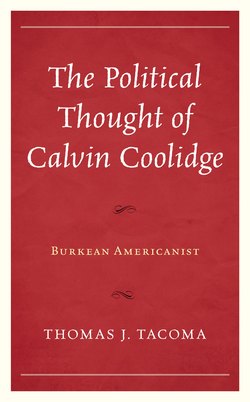Читать книгу The Political Thought of Calvin Coolidge - Thomas J. Tacoma - Страница 16
На сайте Литреса книга снята с продажи.
Pragmatism
ОглавлениеPhilosophic pragmatism contributed another key element to the intellectual ferment that gave birth the intellectual doctrines of Progressivism. Pragmatism as a philosophic system, in brief, stands for the idea that truth is properly understood as a process of determining what works. Truth is to be determined by the probable explanatory ability of a particular theory, not its authority in the realm of principle or abstraction. As William James explained, “It stands for no particular results. It has no dogmas, and no doctrines save its method.”[25] Pragmatism shifts the locus of truth away from the abstract and propositional toward the question of functionality.
The philosophic origins of pragmatism lie with nineteenth-century American philosophers Charles Peirce and Chauncey Wright, but the task of developing and articulating a fully developed philosophy of pragmatism fell first to William James. He explained the philosophy in a lecture, later published in 1907, saying that a pragmatist “turns away from abstraction and insufficiency, from verbal solutions, from bad a priori reasons, from fixed principles, closed systems, and pretended absolutes and origins. He turns towards concreteness and adequacy, towards facts, towards action and towards power.” According to James, pragmatism “means the open air and possibilities of nature, as against dogma, artificiality, and the pretence of finality in truth.”[26] James affirmed that pragmatism consisted in “the attitude of looking away from first things, principles, ‘categories,’ supposed necessities; and of looking towards last things, fruits, consequences, facts.”[27] The pragmatist observes or discovers truth through function and practical consequences. William James explains that pragmatism’s “only test of probable truth is what works best in the way of leading us, what fits every part of life best and combines with the collectivity of experience’s demands, nothing being omitted.”[28] No truth can be understood as definite, unchanging, or inflexible. James leaves space for analytic truths—that an idea or mathematical expression can be true in the rigid sense. But this is only the case for “purely mental ideas.” Only in the case of analytical statements—those that are true by their own definition—can a belief be absolute. But “the objects here are mental objects. Their relations are perceptually obvious at a glance, and no sense-verification is necessary. . . . Truth here has an ‘eternal’ character.”[29]
While William James was the promoter of pragmatism, John Dewey had the insight to apply the new philosophy to social theory. The instrumental perspective on truth contained broad possibilities for experimentation in human affairs and social or political institutions. Richard Hofstadter explains:
The beginnings of the Progressive era, moreover, coincided with the growth and spread of Dewey’s ideas . . . and it is easy to see Dewey’s faith in knowledge, experimentation, activity, and control as the counterpart in abstract philosophy of the Progressive faith in democracy and political action. It is not far from Croly’s appeal to his countrymen to think in terms of purpose rather than inevitable destiny, or from Lippmann’s assertion that ‘we can no longer treat life as something that has trickled down to us,’ to Dewey’s appeal for an experimental approach to social theory.[30]
The contribution made by the new pragmatic philosophy to Progressive political theory is clear, especially in law and legal theory.[31] Political reformers were now at liberty to attempt new legal or political experiments in the improvement of conditions for the majority of citizens. Social experimentation, no longer restrained by existing customs or principles, or natural-law reasoning, opened entirely new possibilities within the American political tradition.
